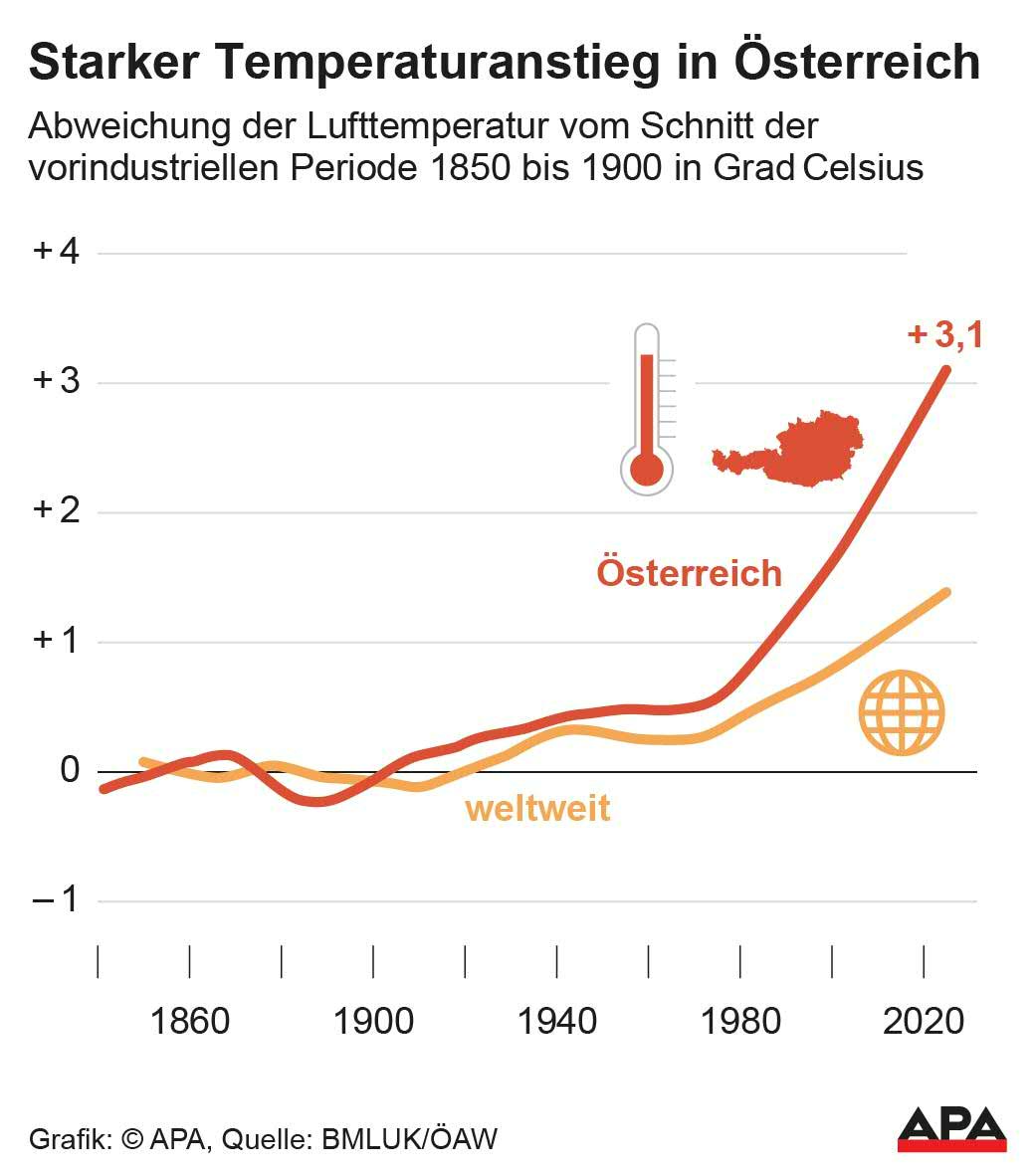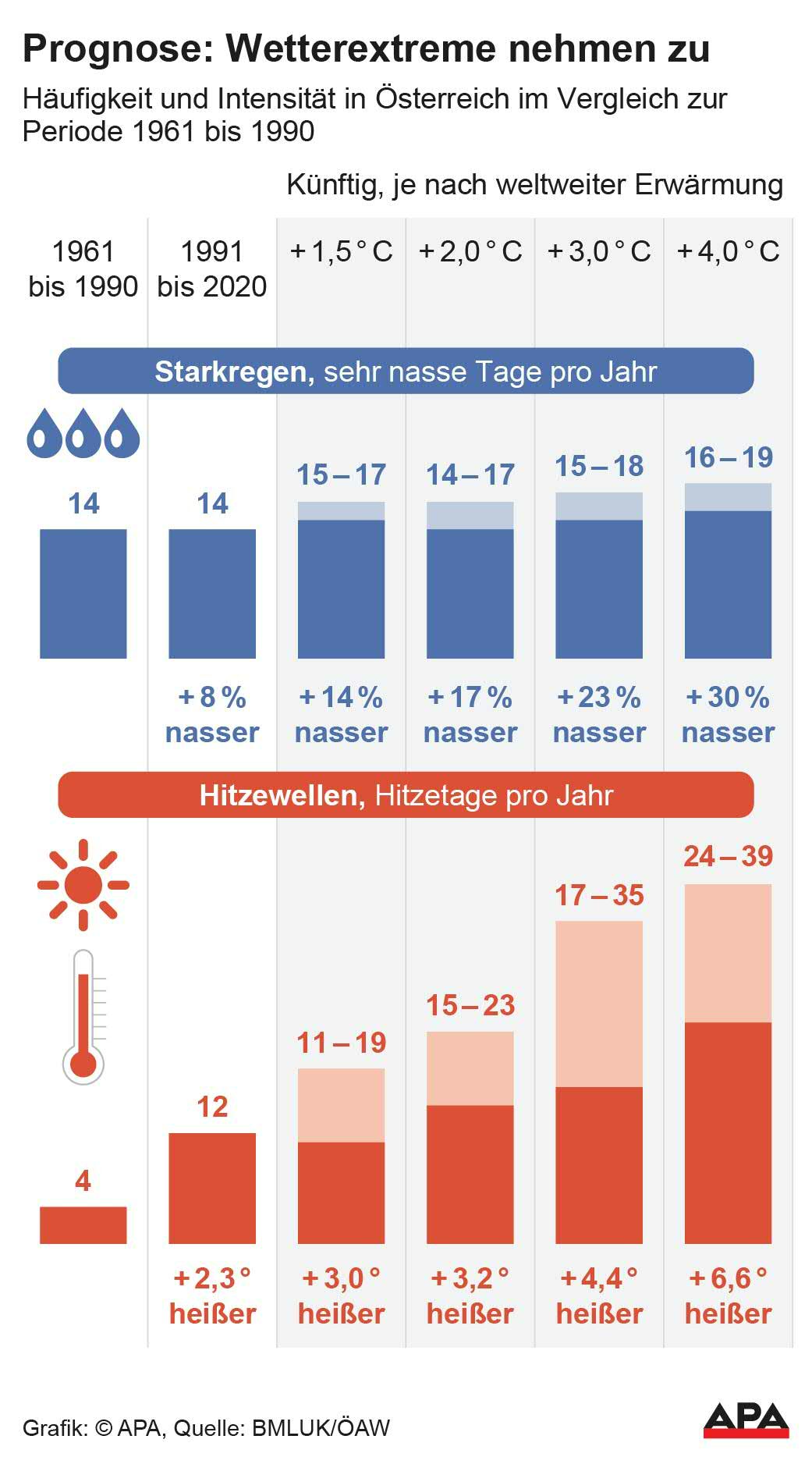Austria is Heating Up Rapidly: Climate Experts Sound the Alarm

200 scientists from 50 institutions have created an interdisciplinary overview of the impacts of the climate crisis in Austria over the years. The result is the approximately 800-page "Second Austrian Assessment Report on Climate Change" (AAR2), whose main statements were presented in Vienna on Tuesday. "The report shows a great need for action that affects us all," was the conclusion of Environment Minister Norbert Totschnig (ÖVP).
Temperature increase of 3.1 degrees since 1900
The assessment report not only shows the threats due to global warming, but also presents options for action - and calls for massive investments. "We are working hard on a climate protection law. The central concern is CO2 reduction, decarbonization, and climate change adaptation," defined Totschnig the political framework for action. In view of the climatic risks, Transport Minister Peter Hanke (SPÖ) is focusing on speed: "We must be fast, we must be innovative," he said about the AAR2 on the sidelines of a press conference. With regard to climate change, "tailor-made logics" are necessary, for example, rural areas must be treated differently than urban ones. Hanke wants to support this specifically with funding.

On average, it is already 3.1 degrees Celsius warmer compared to the year 1900 - with a rising trend. The impacts on land, people, and the environment are significant. To counteract this and avoid tipping important systems, investments between 6.4 and 11.2 billion euros per year are required according to the authors. Political processes need to be reconsidered. "The consequences of the climate crisis endanger our prosperity and also exacerbate social inequalities here," said Margreth Keiler from the University of Innsbruck and the ÖAW, co-chair of the assessment report. The report emphasizes that realistic, socially acceptable, and economically viable paths to climate neutrality are available.
Success through socially just transformation
The social aspect was certainly included in the second assessment report: "Climate change is more than an environmental problem, it affects our entire economic and social system," explained climate researcher Daniel Huppmann. For effective emission reduction, it must also be socially just. For example, older people, low-income individuals, and people in precarious housing situations are particularly vulnerable. At the same time, the top income decile of the population causes more than four times the emissions of the lowest income decile.
However, there is another hurdle to overcome, as "complex responsibilities and coordination processes often slow down the implementation of effective measures for emission reduction and adaptation to climate change," the report states. In the interplay between the political levels of the federal government, the states, and the municipalities, "many measures remain ineffective." This can be seen in recent years, for example, in the unsuccessful attempts to limit the alarming extent of land sealing in the country. Clear responsibilities are needed here, among other things.
Global warming enormous risks for agriculture, tourism, cities
However, there is another hurdle to overcome, as "complex responsibilities and coordination processes often slow down the implementation of effective measures for emission reduction and adaptation to climate change," the report states. In the interplay between the political levels of the federal government, the states, and the municipalities, "many measures remain ineffective." This can be seen in recent years, for example, in the unsuccessful attempts to limit the alarming extent of land sealing in the country. Clear responsibilities are needed here, among other things.
This affects water availability in agriculture, ski tourism, where fewer and fewer days with natural snow cover need to be compensated, the now rather meager remnants of Austria's glaciers, and heat stress, especially in urban areas of the country. "With increasing warming, adaptation limits are exceeded in regions such as the Alps, in water-scarce or heavily sealed areas," states the core statement document of the report. The current risk management "reaches its limits with complex, cascading hazards," which "potentially results in irreversible damage to society, infrastructure, and ecosystems."

Reached or subsequently exceeded adaptation limits are the result of inadequate existing strategies and risk management systems. "This leads to long-lasting or even irreversible consequences for society, infrastructure, and ecosystems," climate researcher Keywan Riahi explained to the APA.
As examples, he mentioned mega-droughts and agricultural damage (which will occur with increased risk at just over two degrees Celsius of global warming) and natural hazards that impair critical infrastructure and economic stability. "Heat-related impacts on health and well-being occur particularly early, which already lead to increased risk of mortality and reduced work productivity at two degrees of global warming."
Scientists warn: Trend points towards plus four degrees
Looking at the current global trend, we are heading in our regions towards an increase of "significantly more than four degrees Celsius compared to pre-industrial times," according to the more than 200 scientists involved in the paper. It is the second of its kind after the premiere in 2014, funded by the Ministry of Agriculture through the Climate and Energy Fund and implemented by the Austrian Panel on Climate Change (APCC).
As chairpersons of the panel, alongside Keiler from the University of Innsbruck and the Academy of Sciences (ÖAW), are Daniel Huppmann and Keywan Riahi (both from the International Institute for Applied Systems Analysis IIASA, Lower Austria) and Harald Rieder from the University of Natural Resources and Life Sciences (Boku) in Vienna.
NGOs want to see action and criticize environmental policy
Domestic environmental protection organizations have unanimously called for swift consequences in response to the published "Second Austrian Assessment Report on Climate Change" (AAR2) - while criticizing the government. Politics must listen to science "and act immediately," said the WWF. Global 2000 opposed the "red pen" in climate protection, and Greenpeace warned that without action, things would get even worse in the future.
In light of the report, Global 2000 also emphasized that it also provides grounds for hope: "They (the further chapters of the AAR2, note) show fields of action for politics and the economy that could finally put us on the target path," spokeswoman Hannah Keller stated. However, a socially just transformation of the economy and society would only succeed "if prosperity is detached from the dependence on fossil fuels, the sealing of land, and the excessive consumption of resources," Keller concluded.
Nature as an "ally" against the climate crisis
The WWF also advocated for "preventive investments in truly effective climate protection measures and diverse natural spaces." An intact nature is an indispensable ally against the climate crisis, argued Karl Schellmann from WWF. He cited free-flowing rivers, which would serve as natural protection during floods, as well as "intact moors and mixed forests," which in turn provide habitat for numerous animals and serve as CO2 storage.
The status report also led to renewed calls for the abolition of so-called climate-damaging subsidies. For example, the mobility organization VCÖ stated that the current federal government's budget was a missed opportunity. "On the contrary, the NoVA exemption for diesel transporters and the tripling of the commuter euro increase climate-damaging subsidies instead of reducing them.
FFF Want Climate Protection Law with Responsibility
"Fridays for Future" responded in a statement to the climate protection law announced by Environment Minister Norbert Totschnig (ÖVP) for the summer. This would be effective "if not only the path with sector targets is anchored, but also clearly states who is responsible if the targets are missed," demanded Laila Kriechbaum, spokesperson for "Fridays For Future." Otherwise, it would only be lip service, akin to a New Year's resolution on New Year's Eve. Instead, "a strong climate law, more money for renovations and heating exchange, and a real boost for renewable energy" are needed, said Jasmin Duregger, climate and energy expert at Greenpeace in Austria.
Criticism of budget cuts also came from Katharina Rogenhofer, director at the institute "Kontext": "About a third of the total savings in the double budget 2025/26 affect the climate sector. Especially here, the savings could prove to be a boomerang for budget consolidation," she said, referring to the climate goals. Because with the penalty payments if Austria does not meet the EU climate targets, a billion-euro Damocles sword would hang over the budget.
More Risk in the Alpine Area
The climate protection NGO "Protect Our Winters" and the Austrian Alpine Club warn of the already visible and upcoming impacts of climate warming on sports, infrastructure, and habitat in the alpine area. Increased rockfalls and the retreat of glaciers and permafrost mean more risk and higher maintenance efforts. "The Alps are among the regions in Austria most affected by the climate crisis," it was stated.
"There is a red alert in Austria," was the conclusion of Leonore Gewessler, spokesperson for climate protection and energy of the Greens. She did not see any corresponding reactions from the three governing parties: "SPÖ and NEOS spoke extensively about consistent climate protection during the election campaign, but currently, little seems to be left of it. Both are watching while the ÖVP advocates at the EU level for weakening climate targets, dismantling environmental protection in the supply chain law or the forest protection law," Gewessler was quoted in a statement.
(APA/Red)
This article has been automatically translated, read the original article here.
Du hast einen Hinweis für uns? Oder einen Insider-Tipp, was bei dir in der Gegend gerade passiert? Dann melde dich bei uns, damit wir darüber berichten können.
Wir gehen allen Hinweisen nach, die wir erhalten. Und damit wir schon einen Vorgeschmack und einen guten Überblick bekommen, freuen wir uns über Fotos, Videos oder Texte. Einfach das Formular unten ausfüllen und schon landet dein Tipp bei uns in der Redaktion.
Alternativ kannst du uns direkt über WhatsApp kontaktieren: Zum WhatsApp Chat
Herzlichen Dank für deine Zusendung.








